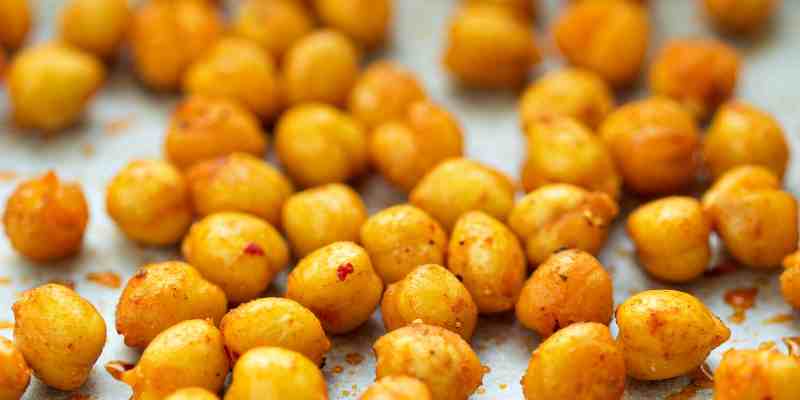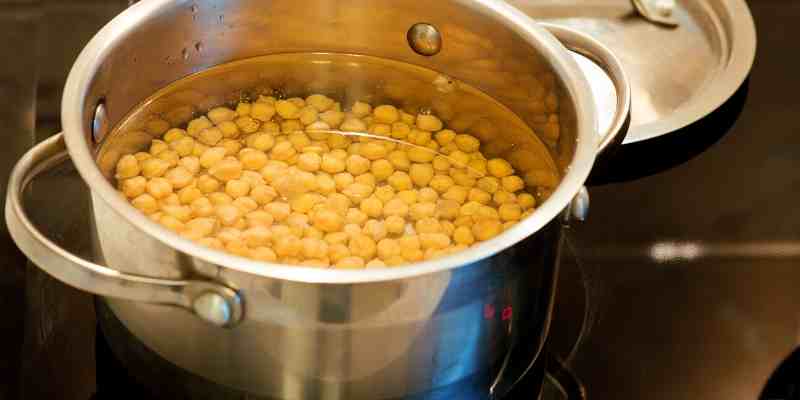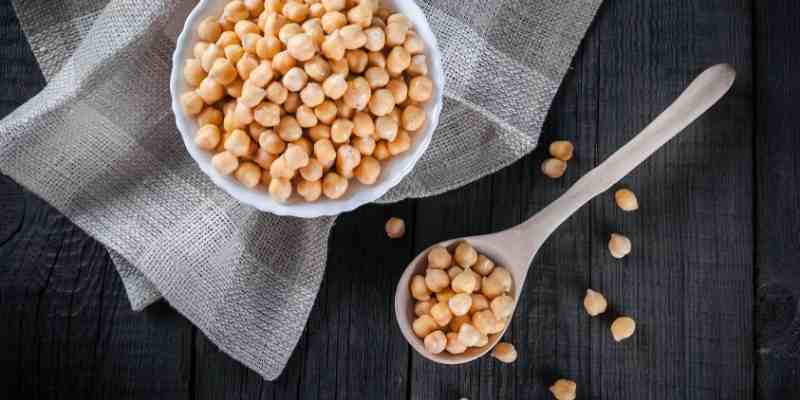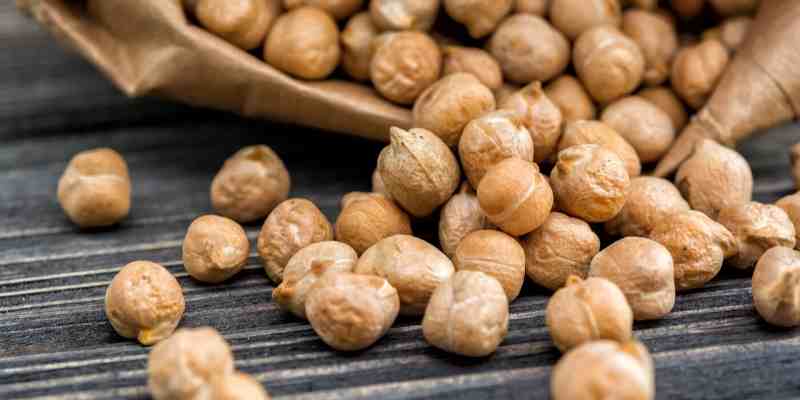Are you interested in a particular topic about chickpeas and dogs? Then use the table of contents below to jump to the most relevant section. And you can always go back by clicking on the black arrow in the right bottom corner of the page. Also, please note that some of the links in this article may be affiliate links. For more details, check the Disclosure section at the bottom of the page.
- Chickpeas. Nutritional positives and negatives
- Are chickpeas good for dogs then?
- Can dogs eat dried chickpeas?
- Can dogs eat roasted chickpeas?
- Can dogs eat canned chickpeas?
- Can dogs eat fresh chickpeas?
- Can chickpeas be toxic for dogs in any way?
- Chickpeas in dog food
- Can dogs have chickpeas? Summary
- Sources
Chickpeas. Nutritional positives and negatives
Chickpeas established itself as quite a healthy food for us humans.
For instance, in one research, it was found that adding a small amount of it to a daily diet can help to prevent colon cancer. (1)
Another study found that ciceritol, one of the compounds found in chickpeas, can potentially act as prebiotics (also a good thing). (2)
Another analysis found that many bioactive compounds from chickpeas can be beneficial in reducing the complications linked to various human diseases. But on the other hand, excessive consumption of chickpeas may enhance allergic problems in sensitive organisms. (3)

Are chickpeas good for dogs then?
Yes, chickpeas are suitable for dog consumption. More to that, chickpeas have high levels of fiber, which helps your pup feel fuller for longer hours. It’s also an incredible source of protein. However, you shouldn’t get overboard and replace animal protein with chickpeas at all times.

Can dogs eat dried chickpeas?
No, dried chickpeas are tough to digest even for humans. Your pouch might have a hard time chewing the dried type of chickpeas. Not talking about processing it.

Can dogs eat roasted chickpeas?
According to the USDA (United States Department of Agriculture) Food Database, the 100g serving of roasted chickpeas contains 286 calories, 17.86g of protein, 60.71g of carbs, including 21.4g of fiber and 7.14g of fat.
It also has some vitamins and minerals, including 36mg of Calcium, 821mg of Potassium, 4.61mg of iron, etc. And 679 mg of sodium (which very high for your pup as recommended daily intake of sodium for an average-sized dog is 100mg).
But as long is it a small serving roasted chickpea is ok to feed your furry friend. If you are not roasting it yourself, make sure it doesn’t contain any potentially harmful flavorings. Even better if it’s unsalted. (Those might be not very delicious for humans, but that way it’s definitely healthier for both us and dogs).


Can dogs eat canned chickpeas?
canned chickpea contains 100 calories, 6g of protein, 20g of carbs, including 7g of fiber and 2g of fat. It also has 360 mg of sodium. And while the nutritional value and composition are still fine, this product is quite high in sodium.
So it’s always recommended to use dried chickpeas over canned ones. Canned chickpeas typically have a lot of salt.
And if you are absolutely HAVE to give your dog canned chickpeas, give it a warm rinse before giving it to your pup. Or try to look for plain unsalted options.

Can dogs eat fresh chickpeas?
Yes, they can. Chickpeas have lots of nutrients, including Vitamin K, zinc, copper, folate, phosphorus, and selenium, among others. And doesn’t have any artificial preservatives and taste enhancers. Just go with the small amounts. And always talk to your vet first before including new food to your pup’s diet.


Can chickpeas be toxic for dogs in any way?
Unfortunately, chickpeas can make your gassy dog even worse (sorry bulldogs, we are calling you out!). This food may likely lead to bloating or even abdominal cramps. You should introduce legumes slowly to your dog as you watch their gastrointestinal issues.
Chickpeas are a healthy treat option for your furry friend, but you need to be prepared for your dog’s gassy experience. Also, look out for the allergies.
As a rule of thumb, when introducing new food to your pet, start with the smallest portions. And watch the dog for a few days for any unusual signs to make sure that the food is safe.

Chickpeas in dog food
Overall, chickpea is an excellent source of plant-based protein for dogs. Otherwise, how can you explain the fact that there are literally hundreds of dog recipes featuring this ingredient?
Just browse the chickpea recipe selection of dog food on Amazon and see for itself -it’s huge!
And if you ask me, sometimes it makes more sense to choose those formulas, developed with your pup’s nutritional needs in mind rather then human products.
For instance, chicken and chickpea treats are low and calories (less than 1.5 calories per one). And the list of ingredients is also quite impressive. Perfect product for smaller dogs who are falling in love with chickpea.
Or beef and chickpea dinner – another great option for any pup interested in the world of plant-based proteins. It has a bunch of vitamins added to boost its nutritional value. And, most importantly, for any grain-free recipe – it also contains taurine to ensure that the pup’s heart remains strong and healthy.

Can dogs have chickpeas? Summary

Chickpea is a healthy treat for your pup, but at the same time, you will need to be careful. Keep those chickpea servings small, don’t get overboard with salty and spice product.
And skip all chickpeas recipes containing onions, garlic, etc. (E.g. if you thinking that hummus is OK we recommend checking our guide “Can dogs eat hummus?”)
Also, as always, when introducing a new product to your pet’s diet, it’s never a bad idea to discuss it with your vet first.

Sources
(1) Xariss M. Sánchez Chino, Cristian Jiménez Martínez, Verónica R. Vásquez Garzón, Isela Álvarez González, Saúl Villa Treviño, Eduardo Madrigal Bujaidar, Gloria Dávila Ortiz & Rafael Baltiérrez Hoyos (2017) Cooked Chickpea Consumption Inhibits Colon Carcinogenesis in Mice Induced with Azoxymethane and Dextran Sulfate Sodium, Journal of the American College of Nutrition, 36:5, 391-398, DOI: 10.1080/07315724.2017.1297744
(2) Effects of ciceritol from chickpeas on human colonic microflora and the production of short-chain fatty acids by in vitro fermentation Author: Yun Zhang,Di Su,Jinyan He,Zhuqing Dai,Riaz Asad,Shiyi Ou,Xiaoxiong Zeng © 2017 Elsevier Ltd. All rights reserved. https://doi.org/10.1016/j.lwt.2017.01.040
(3) Health Risks and Benefits of Chickpea (Cicer arietinum) Consumption. Rinkesh Kumar Gupta, Kriti Gupta, Akanksha Sharma, Mukul Das, Irfan Ahmad Ansari, and Premendra D. Dwivedi. Journal of Agricultural and Food Chemistry 2017 65 (1), 6-22DOI: 10.1021/acs.jafc.6b02629
Thanks for the blog graphics: Canva.com


